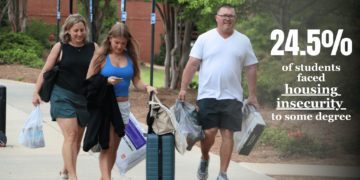In 2021, suicide was the third leading cause of death for people ages 15 to 24 in the United States, according to the National Institute of Mental Health. During September’s Suicide Prevention Month, this statistic is on the minds of many students and mental health professionals.
Juawice McCormick, director of the university’s counseling center, emphasized the importance of recognizing Suicide Prevention Month.
“Suicide Prevention Month presents renewed and ongoing opportunities to heighten awareness and provide information and suicide prevention education, such as promoting healthy connections, focusing on coping and problem-solving skills, identifying and supporting people at risk and lessening harms and preventing future risk,” McCormick said.
Laura Drislane is a licensed clinical psychologist with a background in suicide risk assesment and an assistant professor of psychology at the University of Mississippi.
“Currently suicide is the 11th leading cause of death in the United States,” Drislane said.“We’ve seen suicides increase at a higher rate in rural communities compared to those living in urban environments.”
Mississippi lost 417 lives to suicide in 2022 — a 14.8% increase compared to 20 years prior — according to the Centers for Disease Control and Prevention. Mississippi communities face many challenges that support that disproportion, Drislane said.
“Living in poverty and experiencing financial hardships, unsafe or unstable housing and unemployment can all cause immense stress contributing to elevated suicide rates,” Drislane said. “Rural residents are also more likely to be geographically distant from friends, family and neighbors, which can lead to feelings of social isolation.”
Erin Harrell, a psychiatrist and nurse practitioner in Oxford and Hernando, Miss., echoed this.
“We know that the opioid epidemic has hit Mississippi especially hard, and I think that’s true for a lot of communities that fall on the lower end of the socioeconomic spectrum, which is why we find that mental illness does tend to congregate in those communities, as they have a lack of access to things like counseling, therapies, groups, social supports and diagnosis and treatment of mental illnesses,” Harrell said. “And so a lot of times, those people will find themselves feeling very alone, and that’s kind of a way out.”
Drislane emphasized the importance of small efforts in making individuals feel connected.
“Tragically, people who die by suicide often have the misperception that they are a burden on others and that the people around them would be better off without them,” Drislane said. “A simple daily phone call for a couple of minutes can go a long way to making someone feel connected and might even be life-saving.”
Carmen Hillhouse, a counselor at the university’s wellness center, encouraged those struggling with mental health to seek counseling.
“Give it a try and see if that’s something that you like because you can’t allow other people’s opinions to affect you and your health,” Hillhouse said. “You have to see if it’s something that is a good fit for you.”
The University Counseling Center has many programs in place for anyone who is struggling with mental health.
“We have licensed counselors available 24/7, 14 licensed clinicians, 10 graduate students from counseling and psychology, three nurse practitioners and a psychiatrist available to our campus community at the (University Counseling Center) or via telephone,” McCormick said. “This service is essential for students in crisis in need of immediate support.”
In addition to seeking counseling, keeping healthy habits like regular sleep can help students maintain their mental health.
“If you sleep better, your mood improves dramatically, and if you’re feeling good, you sleep better,” Drislane said.
Kiersten Ingalsbe, a sophomore criminal justice major from Summerville, S.C., explained what she does to cope with stress.
“I like to take walks around campus, listen to music, play with sensory toys or watch movies,” Ingalsbe said. “All of those things are great ways to alleviate college stress.”
McCormick reiterated the importance of awareness.
“This month is an ongoing opportunity to remind us all that we matter, that help is available for all and that there are other solutions to our problems (and) other ways to manage and heal from the pain we are experiencing,” McCormick said. “We are all beloved.”


























